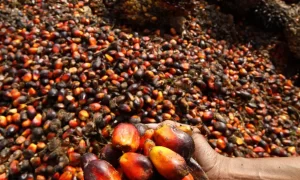Malaysian Palm Oil Prices Climb Due To Middle East Tensions

Malaysian palm oil futures surged amid rising crude oil prices due to escalating Middle East tensions, enhancing palm oil’s appeal as a biodiesel feedstock. This price increase reflects broader market volatility, impacting other edible oils like soyoil. Additionally, the EU faces a 36% decline in palm oil imports, signaling tightening supply and potential price hikes ahead.
Malaysian palm oil futures surged on Wednesday as escalating Middle East tensions sparked a sharp rise in crude oil prices, lifting palm oil’s appeal as a biodiesel feedstock.
What does this mean?
The uptick in Malaysian palm oil prices comes after Iran’s ballistic missile strike on Israel heightened fears of a broader conflict, potentially disrupting crude oil production in the region. The benchmark palm oil contract for December delivery on the Bursa Malaysia Derivatives Exchange rose by 39 ringgit (0.97%) to 4,045 ringgit ($972.59) per metric ton by midday, continuing a 1.8% gain from overnight trading. Simultaneously, Brent crude futures for December delivery increased by 1.88% to $74.94 per barrel. Higher crude oil prices make palm oil a more attractive biodiesel option, which, in turn, pushes up its demand and price.
Why should I care?
Rising crude oil prices due to geopolitical unrest are making palm oil a go-to for biodiesel, influencing global edible oil markets. Investors should note that other edible oils, like soyoil, followed palm oil’s ascent, highlighting the interconnectedness of these commodities. While Dalian’s vegetable oil markets remained closed for China’s Golden Week holiday, soyoil prices on the Chicago Board of Trade shot up by 1.14%. Stay tuned for continued market shifts impacted by volatile crude oil prices.
The EU, the world’s third-largest importer of palm oil, saw a 36% decline in imports for the 2024/25 season, reflecting tightening supply and rising prices. Meanwhile, the ringgit’s slight appreciation against the dollar makes palm oil pricier for buyers dealing in foreign currencies, potentially impacting global trade dynamics. Analysts, like Reuters’ Wang Tao, suggest that palm oil prices could climb further, signaling a potential uptrend. Understanding these larger economic movements is crucial for anticipating long-term market behavior and investment strategies.
Source Link : https://finimize.com/content/malaysian-palm-oil-prices-climb-due-to-middle-east-tensions

















